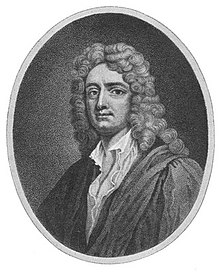Author:Anthony Ashley Cooper (1671-1713)
Jump to navigation
Jump to search
For authors with similar names, see Author:Anthony Ashley Cooper.
Works
[edit]- A speech lately made by a noble peer of the realm (1681) (external scan)
- An impartial account of the nature and tendency of the late addresses: in a letter to a gentleman in the country (1681) (external scan)
- An Inquiry Concerning Virtue. (1699) (external scan). Shaftesbury renounced this first edition as unauthorised, and rewrote the work between 1705–10.
- A Letter concerning Enthusiasm (1708) (external scan)
- Sensus Communis (1709)
- The Moralists (1709)
- Soliloquy Communis (1709)
- A notion of the historical draught or tablature of the judgment of Hercules, 1713 (external scan)
Collected works
[edit]- Characteristicks of Men, Manners, Opinions, Times (1st edition 1711; 2nd, corrected and enlarged, edition 1714), in 3 vols.
- John Baskerville edition (1773):
- Volume I. (transcription project)
- A Letter concerning Enthusiasm
- Sensus Communis; an Essay on the Freedom of Wit and Humour
- Soliloquy, or Advice to an Author
- Volume II. (transcription project)
- An Inquiry concerning Virtue and Merit
- The Moralists; a Philosophical Rhapsody
- Volume III. (transcription project)
- Miscellaneous Reflections on the said Treatises, and other critical Subjects
- A Notion of the Historical Draught, or Tablature of the Judgment of Hercules
- A Letter concerning the Art, or Science of Design
- Volume I. (transcription project)
- John Baskerville edition (1773):
Works about Cooper
[edit]- "Cooper, Anthony Ashley (1671-1713)," in Dictionary of National Biography, 1885-1900, London: Smith, Elder, & Co. (1885–1900) in 63 vols.
- "Shaftesbury, Anthony Ashley Cooper, 3rd Earl of," in A Short Biographical Dictionary of English Literature, by John William Cousin, London: J. M. Dent & Sons (1910)
- "Shaftesbury, Anthony Ashley Cooper, 3rd Earl of," in Encyclopædia Britannica (11th ed., 1911)
![]()
Some or all works by this author were published before January 1, 1929, and are in the public domain worldwide because the author died at least 100 years ago. Translations or editions published later may be copyrighted. Posthumous works may be copyrighted based on how long they have been published in certain countries and areas.
Public domainPublic domainfalsefalse
